|
| |
This week in: Peace & Security Publications |
IPSI | Africa | Americas | East Asia | Europe & Central Asia | Middle East | South Asia
|
|
|
|
| |
This week in Peace & Security Publications
|
|
|
|
| |
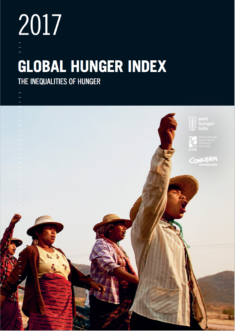
International Food Policy Research Institute: The 2017 Global Hunger Index (GHI) shows long-term progress in reducing hunger in the world. The advances have been uneven, however, with millions of people still experiencing chronic hunger and many places suffering acute food crises and even famine…
|
|
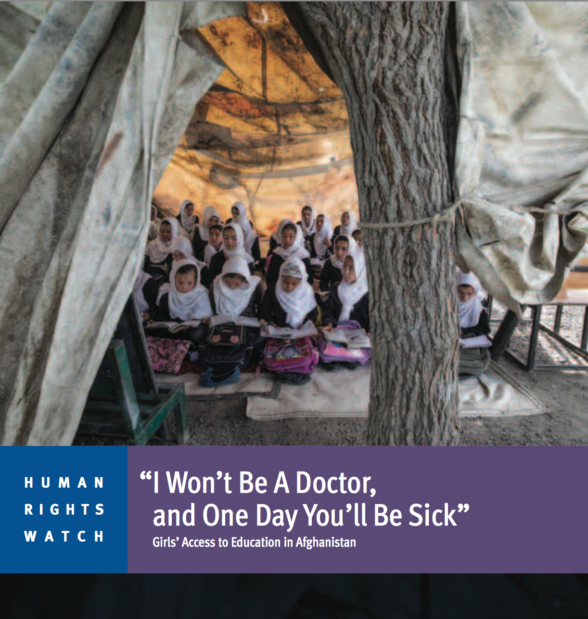
HRW: This report describes how, as security in the country worsens and international donors disengage from Afghanistan, progress made toward getting girls into school has stalled.
|
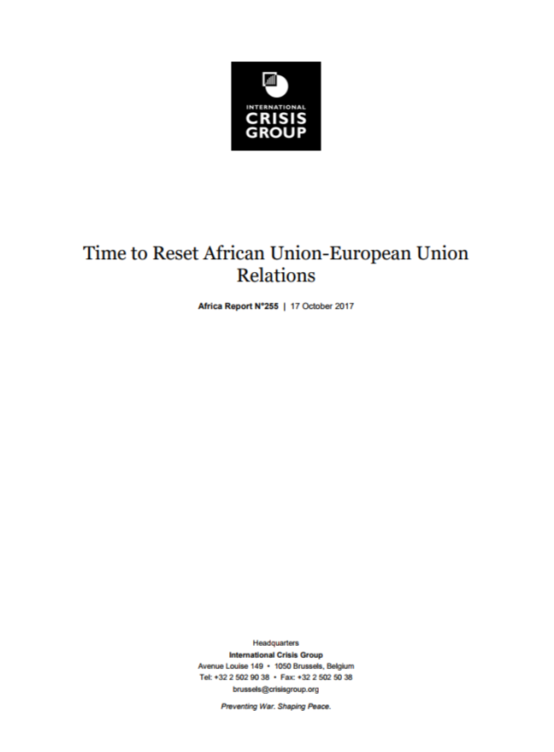
International Crisis Group: African and European leaders are scheduled to meet in November for the fifth triennial African Union-European Union summit at a time when relations between the two institutions have reached a turning point.
|
|
|
|
|
|
| |

Packed Agenda for the 2017 Civil Affairs Symposium! This year’s Civil Affairs Association Symposium on “Civil Affairs: A Force for Consolidating Gains” in Chicago 2-4 November has a packed agenda for all members of the Civil Affairs Regiment and its many partners, including IPSI…
|
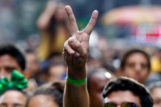
IPSI Board Member Chic Dambach pens an article for HuffPost on how to find hope within the current state of affairs and how everything we see through the media may not always be the case.
|
|
|
|
|
|
| |
This week in Sub-Saharan Africa
|
|
|
|
| |
LIBERIAN: Ex-footballer to face Vice President in presidential runoff
On Sunday, former football player George Weah is expected to face Liberian Vice President Josepth Boakai in a runoff election for the Liberian presidency after no candidate gained an absolute majority in the October 10 election. According to local media sources, Bokai, 72, has sought to distance himself from former President Ellen Johnson Sirleaf and define his own political agenda. Weah entered politics in 2005 when he ran against Sirleaf in the country’s first election after 14 years of civil war. Although he won the first round of poll, he lost to Sirleaf during the runoff. Comment: Once a winner is declared, the political process that will ensure represents the country’s first democratic transition of power in more than 70 years. Liberia emerged from a brutal civil war in 2003 after more than 250,000 people were killed in 14 years of fighting. (Aljazeera, BBC News, The Guardian)
|
|
|
|
|
| |
SOMALIA: Three days of mourning declared after blast
On Saturday, a truck bomb blast in the capital city Mogadishu left at least 300 people dead and around 320 others injured, making it the deadliest single attack in the country’s history. President Mohamed Abdullahi Mohamed Farmaajo declared three days of national mourning beginning on Sunday. Emergency services were overstretched and worked late into the night as they tried to rescue people who were trapped in the destroyed buildings. The President blamed al-Shabaab for the attack. Comment: Al-Shabaab has a strong presence in the south of the country. Al-Shabaab has not yet claimed responsibility for the blast, but the Somali leaders express certainty that they are responsible. (The Guardian, Aljazeera, The Washington Post)
|
|
|
|
|
| |
KENYA: Political crisis deepens in run-up to election
| |
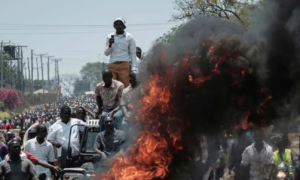
|
On Tuesday, an election commissioner resigned and fled the country saying she and her staff were facing intimidation and threats. The political crisis appears to be deepening, with the head of the election board saying it cannot guarantee next week’s presidential election rerun will be free, fair, and credible. Raila Odinga, the opposition leader, called for mass protests on October 26, the day of the presidential election, which he has refused to take part in. The president, however, has insisted the election must take place. Amnesty International and Human Rights watch reported that 67 opposition supporters have been killed in protests since the August 11 announcement that Kenyatta had been re-elected in the first poll. Comment: Kenya is scheduled to hold a presidential election re-run next week after the country’s supreme Court annulled the results of the August 8 vote because of irregularities and illegalities in the electoral process. The top information technology official at the Kenyan electoral commission was murdered shortly before the August polls. His death significantly undermined the confidence of many Kenyans in the vote. (Aljazeera, The Guardian, Standard Newspaper, The New York Times)
Researched/Written by Brian Adienge
|
|
|
|
|
| |
This week in the Americas & Caribbean
|
|
|
|
| |
CANADA: Quebec bans face coverings for citizens who receive public services
On Wednesday, the Canadian province of Quebec passed a religious neutrality law which bars people from wearing face coverings when utilizing public services such as healthcare, municipal and public transit. Quebec’s Minister of Justice Stéphanie Vallée, who administered the bill, stated that the new law would provide social cohesion for all people within the province. Critics of the bill have stated that the law will further marginalize Muslim women and their accessibility to services. Comment: The National Council of Canadian Muslims voiced their concern for the passage of the bill, stating how the bill “boils down to ugly identity politics.” Legal experts have also dismissed the law as unconstitutional and expect the courts to strike the bill down. (Montreal Gazette, The New York Times, CNN, BBC News)
|
|
|
|
|
| |
PANAMA: Report finds indigenous people to be most affected by country’s inequality
On Wednesday, the Organization for Economic Cooperation and Development published a study that showed how the Indigenous people of Panama are affected by higher poverty and inequality rates. Panama’s Deputy of Indigenous Affairs Feliciano Jimenez stated that the government will focus on four key areas of sanitation, governance, education, and health to promote the equity of Indigenous peoples. Panamanian lawyer Hector Huertas stated that there are no prominent laws or policies in place to assist with the development of Indigenous lands. Comment: Despite USD 80 million in assistance from the government, Indigenous communities throughout Panama still find their needs unmet due to unestablished policies. (Prensa Latina, TeleSur, Latin American Herald Tribune)
|
|
|
|
|
| |
VENEZUELA: Election results called into question by opposition
On Monday, the Democratic Unity (MUD) coalition in Venezuela called for protests after election results were in favor of President Nicolas Maduro and the Socialist Party. The ruling party won 20 governorships throughout Venezuela, with the MUD Campaign Chief Gerardo Blyde demanding an audit of all votes and polling sites. The U.S. Department of State condemned the elections in Venezuela, stating that the voices of Venezuelan citizens “were not properly heard.” Comment: In July, President Maduro called a referendum in order to change the constitution to elevate his position. When the referendum passed, the U.S. leveled sanctions against Maduro by freezing his U.S. assets and prohibiting U.S. citizens from working with him. (Al Jazeera, NPR, The Guardian, BBC News)
Researched/Written by Blessing Ikpa
|
|
|
|
|
| |
This week in East Asia & Pacific
|
|
|
|
| |
AUSTRALIA: UNHCR urges Australia to prevent imminent humanitarian crisis
On Wednesday, the United Nations High Commission for Refugees (UNHCR) urged Australia to mitigate a potential humanitarian crisis over the closure of the detention center on Manus Island in Papua New Guinea. UNHRC addressed the lack in planning and long-term solutions for those without an arrangement for relocation, increasing the risk of instability and harm. Of the 900 detainees, many refused to move from the asylum due to safety concerns, others refuse to return to their country of origin while some refugees were threatened with arrest if they do not vacate. Comment: Last week, Australia was elected to the UN Human Rights Council causing the UN to investigate its human rights record. (The Australian, The Guardian, BBC)
|
|
|
|
|
| |
MYANMAR: Amnesty International calls out crimes against humanity in report
On Wednesday, Amnesty International released a report detailing Myanmar’s crimes against humanity, including mass killings, rape, torture, and forcible transfers of its Rohingya Muslim population. Restricted access to Rohingya towns is leading to blocked media and limited aid reaching the Rohingya. A lack of food is causing a new surge of refugees to enter Bangladesh. Comment: Around 582,000 refugees escaped Myanmar since August. Satellite images from Human Rights Watch show at least 288 villages partially or entirely destroyed by fire. (Amnesty International, The Telegraph, 1,2, Al Jazeera, 1,2,3, The Guardian)
|
|
|
|
|
| |
PHILLIPPINES: Duterte announces liberation of Marawi from militants
On Tuesday, President Rodrigo Duterte declared the city of Marawi liberated from militants, a day after the army killed two men who led groups linked to the self-proclaimed Islamic State (IS); however, the military is still active in capturing militants and rescuing hostages. The military believes this speech was symbolic of the beginning of Marawi reconstruction. Comment: 20 to 30 militants remain in Marawi with about 20 hostages including women and children. Over 1,000 civilians were killed since IS militants took control on May 23. (The Inquirer, Al Jazeera, BBC)
Researched/Written by Rabia Uddin
|
|
|
|
|
| |
This week in Europe & Central Asia
|
|
|
|
| |
KYRGZSTAN: Sooronbai Jeenbekov’s presidential win marks first democratic transfer of power
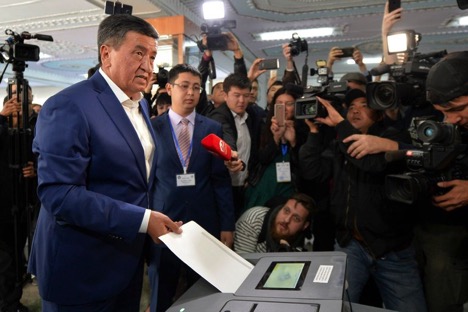
|
|
On Sunday, former Prime Minister Sooronbai Jennebekov was elected President of Kyrgyzstan. Jennebekov won over 12 other candidates, the closest opponent being businessman Omurbek Babanov who gained 33.4 percent of the vote. Babanov called for citizens to accept the vote and “not to succumb to provocations” because Kyrgystan “needs stability.” The transition between former President Almazbek Atambayev and President-elect Jeenbekov, both members of the Social Democratic party, marks the first democratic transfer of power since the country became independent. Jeenbekov was elected to parliament in 1995. He then served as agriculture minister, head of the presidential administration, governor of the Osh region, and was Prime Minister from April 2016 to August 2017. Comment: Analysts expect one of Jeenbekov’s first steps as President will be to mend relations with neighboring Kazakhstan that were damaged throughout the election. There were many accusations in the media that the presidential opponent Babanov took funding from oligarchs in Kazakhstan and that he would work with those in Kazakhstan to incite violence in Kyrgyzstan if he lost the election. These accusations resulted in tightening border security between the two countries and chilled diplomatic relations. (Eurasia Net, Radio Free Europe, Bloomberg News)
|
|
|
|
|
| |
MALTA: Influential journalist killed in car bomb
On Monday, Maltese journalist Daphne Caruana Galizia died when a bomb exploded in her rental car while she was leaving her home. Caruana Galizia worked as a columnist and editor for The Sunday Times of Malta and The Malta Independent. She is most notably known for her work uncovering corruption in the Maltese government with documents released in the Panama Papers leak in April 2016. Her blog, Running Commentary, is one of the most read websites in Malta, with readership surpassing all of the traditional print media combined. The blog highlights the alleged corruption of those with business and political power in Malta. Her son Matthew Caruana Galiza, a journalist and member of the International Consortium of Investigative Journalists (ICIJ), contends that his mother was assassinated for her work in exposing political corruption. The Maltese government, whom Galizia had often accused of corruption, has committed publically to finding and prosecuting her murderers and has called for the assistance of the United States Federal Bureau of Investigation. Comment: The Panama Papers consisted of 11.5 million documents that were released by the Panamanian law firm Mossack Fonseca, with the assistance of the ICIJ, that detailed widespread corruption and tax evasion perpetrated by the world’s wealthiest and most influential people. One of Caruana Galizia’s most recent allegations that came from the Panama Papers leak is that Maltese Prime Minister Joseph Muscat’s wife and political allies are behind a number of shell companies based in Panama that sell Malta passports to the Azerbaijan government while receiving payments from the president of Azerbaijan’s daughter. (Times of Malta, Aljazeera, The Guardian, Time)
|
|
|
|
|
| |
SPAIN: Government to rescind Catalonian autonomy over independence vote
| |
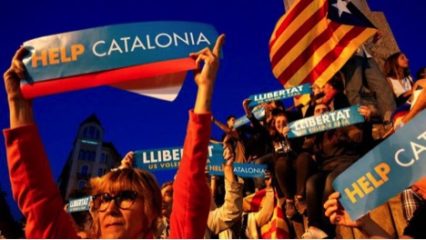
|
On Thursday, the Spanish government announced that it would enact Article 155 of the Constitution giving Spain the power to suspend Catalan’s regional autonomy and impose direct rule over the region. This comes after Catalan President Carles Puigdemont refused the government’s request to suspend plans to declare independence. Government Spokesman Iñigo Mendez Vigo says that the direct rule would “protect the general interest of Spaniards, including the citizens of Catalonia, and restore constitutional order to the region,” but Puigdemont believes this move is instead “blocking dialogue and continuing repression.” Analysists fear that this move could increase the demonstrations and unrest that have been occurring across Spain since the independence referendum took place on October 1. The specific plans on how to invoke Article 155, which has never been utilized before, will be discussed during an emergency cabinet meeting planned for Saturday. Comment: Article 155 allows for Madrid to impose direct rule when they view that a regional government is not adhering to the law. It cannot entirely suspend autonomy, but it can dissolve the Catalan parliament, take control of the regional policy and finances, and call for a snap election. (Agencia EFE, Catalan News, BBC News, The Guardian)
Researched/Written by Amy Pipher
|
|
|
|
|
| |
This week in the Middle East & North Africa
|
|
|
|
| |
IRAQ: Iraqi military retakes Kirkuk and strategic oil fields from Kurdish forces
| |
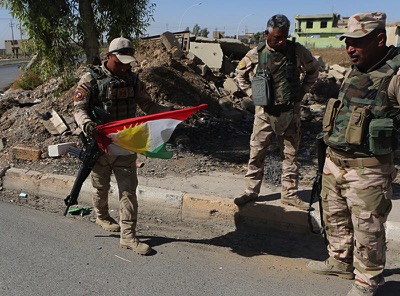
|
Over Monday and Tuesday, Kurdish Peshmerga forces retreated to their long-standing three-province borders after Iraqi Security Force’s lightning operation to retake the oil-rich city of Kirkuk and other disputed provinces. The operation served as a riposte to the Kurdish Regional Government’s (KRG) controversial independence referendum last month. Kurdish fighters largely retreated despite a few sporadic clashes, while more than 61,000 residents were left temporarily displaced in the wake of the offensive. The move severs the KRG’s primary source of income and deals a possibly fatal blow to their hopes for independence. Comment: The disputed areas were included in last month’s successful Kurdish independence referendum, which proceeded with the vote despite strong objections from neighboring states and Washington. Kirkuk is one of 15 disputed areas claimed by both Iraqi Kurdistan and Baghdad. (Kurdistan24, Al Jazeera, Financial Times, AP)
|
|
|
|
|
| |
PALESTINE: Fatah and Hamas sign first major reconciliation agreement in Cairo
Last Thursday, Fatah and Hamas signed a reconciliation agreement brokered by Egyptian intelligence officials in Cairo, ending a decade-long feud between the two factions; the agreement is heralded as the first major step toward a unity government. Details of the agreement are slowly unfolding, but include Hamas handing full control of Gaza to the Palestinian Authority by December 1 and eventually slimming down Gaza’s civil service, with the Palestinian Authority lifting their sanctions on the Strip to provide much-needed humanitarian relief. Israel Prime Minister Binyamin Netanyahu announced on Tuesday that Israel will not try to thwart the reconciliation pact, but will not recognize it, either. Comment: Still left to be decided is the fate of Hamas’ 25,000-strong military wing, which is one of the biggest impediments of any future unity government to attain international recognition. Negotiations toward a unity government are now due to be held ahead of a meeting of all the Palestinian political movements in Cairo on November 21. (Haaretz, Egypt Daily News, BBC, New York Times)
|
|
|
|
|
| |
SYRIA: U.S.-backed forces liberate Raqqa from the Islamic State
| |
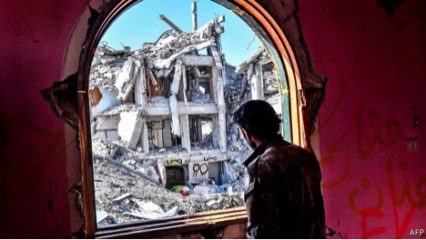
|
On Tuesday, the Syrian Democratic Forces (SDF), backed by an international coalition led by the United States, announced an end to their military operation against the self-proclaimed Islamic State (IS) after capturing their de facto capital of Raqqa in northern Syria. Col. Ryan Dillon, spokesman for the international coalition, confirmed that 90 percent of the city is secured and sweeping operations are underway to clear the city of landmines, booby traps and IS sleeper cells. The UN and other humanitarian organizations are rushing in to assist civilians. Comment: The UN refugee agency said more than 400,000 Raqqawis arrived in critically overcrowded displacement camps in the province over the last few days, warning of the danger of land mines and unexploded ordnance. IS still holds territory to the south of Raqqa and in the eastern province of Deir el-Zour, as well as smaller pockets elsewhere in Syria and Iraq. (Al Arabiya, Twitter, BBC, New York Times, AP)
Researched/Written by Zachary Libow
|
|
|
|
|
| |
AFGHANISTAN: Quadrilateral meetings for Afghan negotiated peace settlement restart in Oman
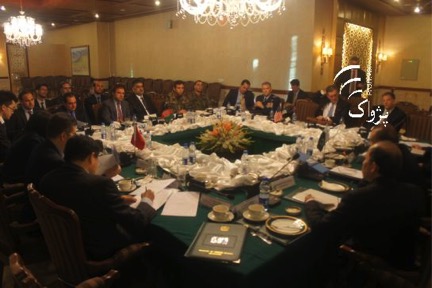
|
|
On Monday, negotiating teams from Afghanistan, China, Pakistan, and the U.S. met in Muscat hopeful to restart the peace process between the Afghan government and the Afghan Taliban. The Quadrilateral Coordination Group (QCG) was created in January 2016 and has held five meetings coordinating peace talks regarding the Afghan conflict, but the process was stalled after Taliban chief Mullah Akhtar Mansoor was killed in a U.S. drone strike in May 2016. Taliban sources claimed not to have received an invitation to this week’s talks and did not participate, casting doubts on the success of a potential peace settlement. Comment: The QCG will also be discussing Afghan-Pakistani relations and counter-terrorism strategies. The Taliban has been gaining territory in Afghanistan in recent years in attempt to oust the Western-backed government and re-establish a fundamentalist Islamic regime. (Express Tribune, The National, Pajhwok, Yahoo India News, RFE/RL, Reuters)
|
|
|
|
|
| |
AFGHANISTAN/PAKISTAN: Drone strikes kill more than 30 militants in 24 hours; Taliban retaliates, killing more than 70
On Monday and Tuesday, a U.S./Afghan joint military operation conducted three drone strikes targeting Taliban compounds along the Afghan/Pakistani border, killing more than 30 militants of the Afghan Taliban and the Pakistani-based Haqqani network. Just hours after Tuesday’s strike, the Afghan Taliban carried out a series of retaliatory suicide attacks in two districts near Pakistan, killing more than 70 and wounding more than 200, mostly civilians. Afghanistan’s deputy interior has called this the biggest terrorist attack this year. Comment: The Pakistani-based Haqqani faction of the Afghan Taliban is considered one of the most brutal, and is known for vicious attacks on Afghan and NATO Troops. The U.S. has long accused Pakistan of turning a blind eye to the militant group. (Gulf-Times, The Himalayan Times, Millennium Post, RFE/RL)
|
|
|
|
| |
REGIONAL: Afghanistan, Pakistan, Nepal elected to UN Human Rights Council
| |
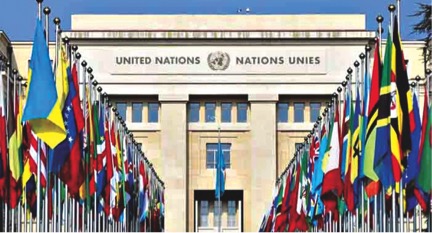
|
On Monday, Afghanistan, Pakistan and Nepal were among 15 nations elected to the UN Human Rights Council (UNHRC) during the 72nd session of the UN General Assembly (UNGA) in New York. These countries will serve in the 47-member policy-making body for a three-year period beginning in 2018. Human rights activists and organizations such as Amnesty International have cautioned Pakistan, as well as others, that human rights conditions at home must be improved. Comment: The other nations elected to the UNHRC include Angola, Australia, Chile, Democratic Republic of the Congo, Mexico, Nigeria, Qatar, Senegal, Slovakia, Spain, and Ukraine. U.S. Ambassador to the UN Nikki Haley reacted to the election results stating that the “election is yet another example of why the Human Rights Council lacks credibility,” and Congresswoman Ileana Ros-Lehtinen, former chairwoman of the U.S. House Foreign Affairs Committee, said the U.S. must withdraw UNHRC membership so as not to “legitimize human rights abusers.” (Greater Kashmir, The Nation, Millennium Post, Canada Free Press, The United Nations)
|
|
|
|
|
| |
REGIONAL: South Asia ranked the worst region on Global Hunger Index
According to the 2017 Global Hunger Index (GHI) published last week, South Asia ranked as the region with the worst hunger situation in the world. The GHI report, published by the International Food Policy Research Institute (IFPRI), measures the hunger situation in a country according to data available for four indicators: percentage of undernourished population, percentage of children under five who suffer from wasting, the percentage of children under five with stunted growth, and the percentage of children who die before reaching five years of age. South Asia’s regional score is largely influenced by high child malnutrition rates in India, where three-quarters of South Asia’s population reside. Comment: Afghanistan, Pakistan and India had the three worst rankings in all of Asia, at 107th, 106th, and 100th respectively, out of 119. India’s child wasting rate has not substantially improved over the past 25 years, and the country is last among the BRICS nations in GHI rankings. (Economic Times, The Hindu, IndiaSpend, Scroll.in, Times of India, GHI, IFPRI)
Researched/Written by Natalie A. Landau
|
|
|

|
|